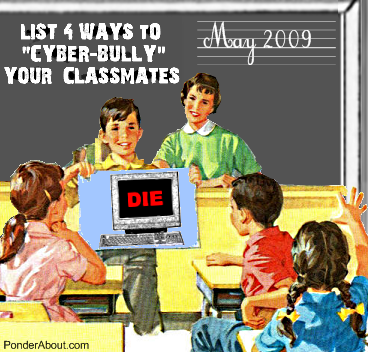While this article talks mostly about school-aged kids and online bullies - make NO MISTAKE - adults (and cyberpaths) bully, harass, threaten and stalk online and much of the same principles apply - EOPC
Hearing that her son's life had been threatened online brought Bonnie Harris a mix of emotions.
She was scared and nervous for her son, but her heart also went out to the troubled boy behind the violent threats.
"It was upsetting. We were all torn," the former Plattsburgh resident and mother of three recalled.
"I don't know how big of a threat he really was, but the police acted on it immediately. At the time, I felt like it was a serious threat, and we were worried about it for a long time."
What started out as a friendship turned into problems that spread to the Internet and involved more than a dozen area teens targeted by an apparent "hit list" posting and an extensive police investigation.
Online bullying and harassment is something local authorities say they're all too familiar with.
"This is a huge issue," Plattsburgh City Police Juvenile Officer Robert Annis said.
"Kids (and adults) seem to be bolder when they're behind a computer, and it gets out of control. It can become an all-night thing. People are just so open online."
'FEEL INVINCIBLE'
As the only juvenile officer in the city, Annis has investigated a number of online bullying and harassment cases during the last few years, most involving girls ganging up on female classmates.
One case involved a black student who received cruel and racist Instant Messages, while another involved a girl who was viciously tormented about her physical appearance.
"I think they feel invincible online," Annis said. "Often, they (the complaints) aren't always major things, but we deal with all of them. We try to nip it in the bud as soon as possible."
State Police Computer-Crimes Investigator Jerome Miner said people "will do things online that they would never do in person," like harass others and share explicit photos and personal information.
Miner, too, has seen his share of teen-related computer complaints, like creating fake MySpace pages to embarrass and insult others.
DRAMA
School officials have also found that online issues outside of school can find their way into the classroom.
"The technology has been a problem and an issue for sure," AuSable High School Dean of Students Suzanne Miller said.
"And it's hard for us sometimes because how far can our reach go outside of school? It's something that we're really concerned about. The anonymity factor is huge and leads to problems."
Emily Lennon, who just graduated from Saranac Lake Central School, said she hasn't been harassed online but has heard of many instances of it, especially among younger Internet users.
"The drama and problems are so much worse with younger kids, like Middle School students," the 17-year-old said.
Bailey Annis, 16, of Saranac Lake said Instant Messages and social-networking sites let teens communicate faster in both positive and negative ways.
"It kind of elevates the gossip," she admitted.
Kelly Petrashune, who just finished her junior year at Saranac Central School, has seen mean pictures and nasty comments posted online.
"And I see MySpace pranks all the time."
WIDESPREAD ISSUE
According to a national i-Safe America study of teens across the nation, about 42 percent of students reported having been bullied online. One in 4 say it has happened more than once.
About 35 percent report having been threatened online, while 21 percent of a random sample have reported receiving mean or threatening messages.
More than half of the students interviewed admitted to being mean or hurtful to their peers online.
Annis said many area schools have become proactive about trying to prevent and stop online harassment, which can lead to criminal charges, such as aggravated harassment.
SPECIAL TRAINING
Law-enforcement agencies have also been beefing up their training and technology to deal with the array of new online crimes.
One aspect of the Plattsburgh City Police Department's annual training is for threat assessment, including online warnings.
"We've dealt with hit lists being put online, and that's one of our biggest fears ... a school incident," Annis said.
"We basically go on alert mode if that happens."
He said that often the first step to bringing online harassment and threats to light is for teens to tell their parents.
"Sometimes, parents don't want to pursue charges; they just want it to stop."
Harris said she didn't know about the online threats until her son was confronted over the phone.
"He (the offender) had messaged him before, but I didn't know. I think a lot of kids don't tell their parents what happens online, and it's important that they do."

No comments:
Post a Comment